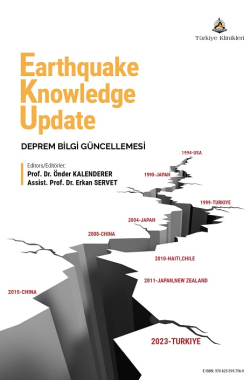STRENGTHENING ORTHOPEDIC DISASTER PREPAREDNESS IN TÜRKİYE: THE ROLE AND STRATEGIC VISION OF TODAK AFTER THE 2023 EARTHQUAKES
Durmuş Ali Öçgüder1 Mehmet Demirhan2
1Ankara Yıldırım Beyazıt University, Faculty of Medicine, Department of Orthopedics and Traumatology, Ankara, Türkiye
2Koç University Hospital, Department of Orthopedics and Traumatology, İstanbul, Türkiye
Öçgüder DA, Demirhan M. Strengthening Orthopedic Disaster Preparedness in Türkiye: The Role and Strategic Vision of TODAK After the 2023 Earthquakes. In: Kalenderer Ö, Servet E, editors. Earthquake Knowledge Update. 1st ed. Ankara: Türkiye Klinikleri; 2025. p.241-243.
ABSTRACT
Following the devastating Kahramanmaraş earthquakes on February 6, 2023, the Turkish Society of Orthopedics and Traumatology Association (TOTBİD) established the Earthquake and Disaster Coordination Board (TODAK) on February 26, 2023. TODAK aims to ensure effective coordination among orthopedic and traumatology professionals and relevant institutions before, during, and after disasters. In line with its objectives, TODAK organized a significant workshop in Istanbul on August 17, 2023, coinciding with the anniversary of the 1999 Gölcük earthquake, emphasizing the critical lessons learned from past events. Issues such as the collapse of healthcare facilities, loss of communication channels, transportation disruptions, and the urgent need for effective disaster response units were addressed comprehensively. The establishment and rapid activation of initial disaster response units, as opposed to slower field hospital setups, were strongly recommended. In 2024, TODAK further expanded its scope by conducting targeted educational panels and workshops during the National Orthopedics and Traumatology Congress, providing crucial insights into disaster-related medical practices. The activities included comprehensive sessions addressing critical topics such as amputation decisions, management of pediatric fractures, open fractures, soft tissue injuries, compartment syndromes, and psychological challenges faced by medical personnel. Additionally, TODAK facilitated numerous specialized training opportunities and courses for orthopedic professionals, particularly benefiting those from earthquake-affected regions. Strategic future planning emphasized the establishment and proliferation of seismically isolated hospitals, utilization of mobile applications for reliable medical record-keeping, standardized pre-disaster training programs, and enhanced psychological support for healthcare providers.
Keywords: Earthquake; Disaster management; Orthopedics; Traumatology; Triage; Disaster planning; Field hospital

